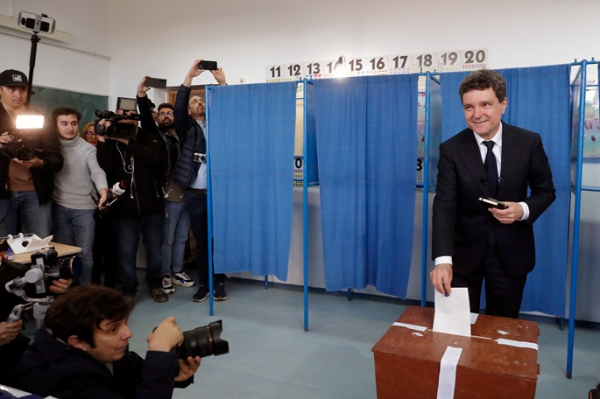Nicusor Dan leads in Romanian presidential runoff

Preliminary exit polls showed that Nicusor Dan, the mayor of Bucharest, holds a lead over his rival George Simion in Romania's presidential runoff on Sunday, reported Xinhua.
According to an exit poll conducted by the AVANGARDE Socio-Behavioral Studies Group, Dan, an independent candidate, secured 54.9 percent of the vote, while Simion, the head of the Alliance for the Union of Romanians (AUR), received 45.1 percent.
A separate exit poll conducted by the Center for Urban and Regional Sociology (CURS) showed a similar outcome. Dan garnered 54.1 percent, compared to 45.9 percent for Simion.
Both exit polls only covered polling stations within Romania. Over 1.64 million Romanian citizens cast their ballots from abroad by 9:00 p.m., according to real-time data from the Permanent Electoral Authority.
Sunday's vote marked the second round of a re-run election, following the annulment of the 2024 presidential results due to alleged campaign irregularities and foreign interference.
Simion, 38, led in the first round held earlier this month, winning 40.96 percent of the vote compared to Dan's 20.99 percent.
A staunch critic of the European Union, Simion has campaigned on a "Romania First" platform, pledging to halt military aid to Ukraine, implement tax cuts, and push for deregulation. Dan, 55, has presented himself as a pro-European reformer.
Under Romania's constitution, the president wields significant authority in foreign affairs, defense, and judicial appointments, including the power to nominate the prime minister.
Polling stations opened at 7 a.m. local time (0400 GMT) and closed at 9 p.m. (1800 GMT). Preliminary results are expected late Sunday night or early Monday.
Portugal's parliamentary elections
Meanwhile, the center-right Democratic Alliance, led by incumbent Prime Minister Luis Montenegro, won the most seats in Portugal's parliamentary elections Sunday, according to exit polls, reported Xinhua.
However, the alliance fell short of the 116 seats needed for a majority, leaving it unable to form a government on its own.
Portugal's unicameral legislature consists of 230 members elected by direct vote to four-year terms. However, this is the country's third parliamentary elections in just three years, held to address ongoing political instability fueled by frequent government collapses and corruption scandals.
Roughly 10.85 million voters took part in the elections. The Democratic Alliance is projected to win 35.1 percent of the vote, securing around 81 seats, well short of the 116 needed for an outright majority.
Notably, exit polls showed the far-right party Chega ("Enough") capturing 25.5 percent of the vote. This puts Chega ahead of the long-established Socialist Party, which secured 25.4 percent, and also positions it as the second-largest political force for the first time.
Since Montenegro has ruled out a coalition with Chega, the party is now expected to lead the opposition.
Led by Pedro Nuno Santos, the Socialist Party suffered its worst result since 1987, and the second-worst in its history, according to exit poll data.
Founded in 2019, Chega has rapidly expanded its influence with a platform centered on anti-corruption, nationalism, and strict anti-immigration policies. The party has attracted significant support, especially among younger voters.
Chega's rise signals a notable shift to the right in Portuguese politics, echoing broader trends across Europe.
The surge reflects growing public frustration with traditional parties and a demand for tougher policies. However, its hardline positions have also raised concerns over the stability of Portugal's democratic institutions.
Poland's presidential poll
Meanwhile, no candidate secured more than 50 percent of vote in the first round of Poland's presidential election on Sunday, according to exit polls.
A runoff will be held on June 1 between ruling coalition candidate Rafal Trzaskowski and independent candidate Karol Nawrocki. The Ipsos exit polls showed that Trzaskowski garnered 30.8 percent of the vote, compared to Nawrocki's 29.1 percent.
The polling stations opened at 7 a.m. local time and close at 9 p.m. on Sunday.
Trzaskowski has served as the mayor of Warsaw since 2018. Nawrocki, a historian and head of Poland's Institute of National Remembrance, is new to electoral politics, but has consistently ranked second in the polls.
- Romania
- Presidential
- Runoff
Source: www.dailyfinland.fi
